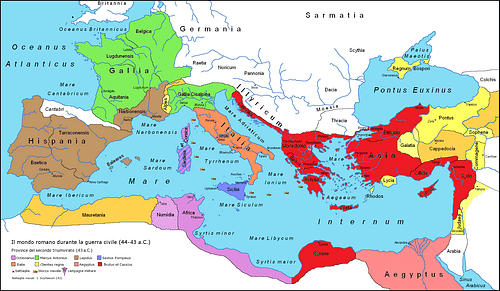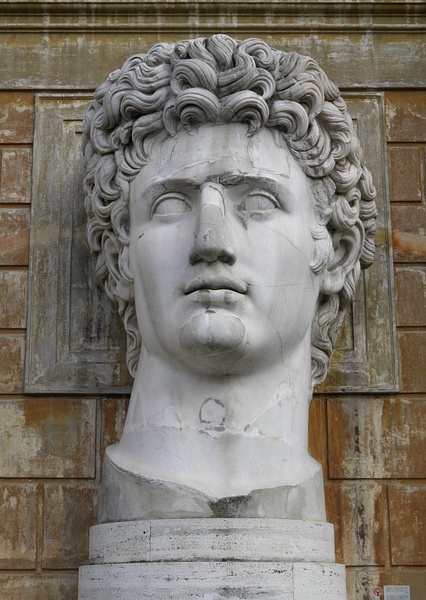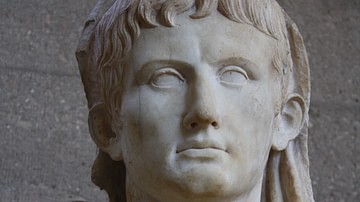
The Second Triumvirate was a political association of convenience between three of Rome's most powerful figures: Mark Antony, Lepidus, and Octavian in the 1st century BCE. Following the assassination of Julius Caesar the three vowed revenge on his killers and attempted to stabilise the Roman Republic in what would turn out to be its death throes. However, the egos of these three men would soon clash, they would eventually meet in battle and, as a result, a single emperor would emerge.
The Death of Julius Caesar
Julius Caesar was dead. On the Ides of March 44 BCE, the dictator-for-life met his fate. Caesar had gradually begun to arouse fear in many of those inside as well as outside the Roman Senate. Even some of Caesar's friends soon became his sworn enemies. They believed they no longer had a voice as Rome was quickly coming under the control of a would-be tyrant. After his death, the Republic was thrown into disarray, and out of its ashes arose three men to form a unique union - a Second Triumvirate - with the sole intent of salvaging the government.
The plot to murder Julius Caesar was a well-conceived scheme. The assassins believed his death would resurrect the old Roman spirit and faith in the Republic would be restored. Unfortunately, while the conspiracy had been well-planned, the exit strategy was not. One of the major conspirators, Marcus Junius Brutus (he is the infamous “Et tu, Brute!” of William Shakespeare's play) rushed from the Theater of Pompey where the Senate met to the Temple of Jupiter on the Capitoline Hill to speak to an angry throng of citizens. Instead of a warm reception, the people of Rome had turned hostile, and despite the Senate's pleas for a compromise and amnesty - an idea supported by Mark Antony - the conspirators were eventually forced to flee the city. Two of the conspirators, Brutus and Cassius (who some believe conceived the plot), escaped to the east.
An Association of Convenience
The new triumvirate was, at best, an unstable coalition. Marcus Antonius (Mark Antony), Marcus Aemilius Lepidus, and lastly, Caesar's grand-nephew and adopted son, Gaius Julius Caesar Octavianus (Octavian) were all men of prominence and strong character. Although Mark Antony and Octavian would soon forego their differences, they had every reason to distrust one another, having waged several military campaigns against each other in northern Italy. They each believed he was the rightful heir to lead the government following Caesar's assassination. Antony further fueled the discord when he blocked Octavian's access to his step-father's money. In addition, Lepidus, the third and most ineffective of the three, was named Chief Priest by Antony although the appointment was supposed to go to Octavian. The Senate saw Antony as another more dangerous tyrant and his continued attempts to seize control of the government after Caesar's demise had brought the ire of the Senate, causing them to declare him a public enemy. Lepidus was also declared a public enemy by the Senate for his vocal support of Antony.
Because of his behavior, Antony had angered a number of influential Roman citizens. Marcus Tullius Cicero, the Roman statesman and poet, wrote a number of scathing essays against Antony. In speaking to the Senate, Cicero said about Antony,
Now listen, I beg you, Senators, I do not mean to the personal and domestic scandals created by Antony's disgusting improprieties, but to the evil, godless way in which he has undermined us all, and our fortunes, and our whole country. (124)
Oddly enough the trio would soon forge a unique alliance, and while a strong a discord existed, the three men were united in their desire to avenge Caesar's death. However, despite their best efforts (or because of it), the Republic would ultimately be plunged into two decades of civil war - something many believed Caesar had predicted.
Despite his youth, the nineteen-year-old Octavian had the support of a significant portion of the army, especially those who had been loyal to Caesar. In 43 BCE, as he sat outside Rome with his army and demanded the Senate grant him the political authority he needed, that is, a consulship. Of course, he was far below the minimum age requirement of 33 (the age had even recently been lowered from the previous requisite 43). Soldiers loyal to Octavian entered the Senate with sword in hand; the Senate wisely reversed an earlier decision and awarded him the consulship along with his cousin Quintus Pedius as co-consul. Immediately, the Lex Pedia was enacted - a decree that reversed an earlier ruling which had granted the conspirators immunity. This new law established a special court which, without delay, condemned all of those involved in Caesar's death, including Sextus Pompey who had not even been involved in the murder.
The Triumvirate is Formed
In October of 43 BCE Lepidus and Antony met Octavian near Bononia to form a triumvirate - a Constitutional Commission - with power similar to that of a consul. While regular daily functions of the government would continue as usual, their sole purpose was to restore stability to the Republic. This new authority allowed them to enact laws without the approval of the Roman Senate. The triumvirate was formally recognized by the Senate in the Lex Titia in November of 43 BCE, granting the trio supreme authority for five years (until January 1, 37 BCE), and assigning them the important task of hunting down the conspirators, especially Brutus and Cassius. Concerning the conspirators, the three had little intention of granting clemency to anyone and a public decree was soon issued, condemning 300 senators and over 2,000 Roman knights or equites. Executioners were sent out. Many of those on the enemies list chose to flee the city, abandoning all of their property. The sale of the seized property was then used to fund the hunt.
The Avengers
Although not directly involved in the assassination of Caesar, one of the names slated for execution was that of Cicero. Some believe Octavian had tried to keep his name off the list, but his writings (his Philippics condemning Antony) had not won him any favors. Cicero had always lived by a personal code - the greatest good was to live in service to the state and oppose anyone who threatened it. He firmly believed Antony was an enemy of the state and should have been killed alongside Caesar. Antony was never one to be in a forgiving mood and especially not one to overlook Cicero's outspokenness. Cicero became one of the first victims of the triumvirate. He was caught attempting to escape from his villa outside Naples. His hands which had written the derogatory essays were symbolically cut off while his head was decapitated and sent to Rome where it was nailed to the speaker's platform in the Forum. Besides Cicero, another significant conspirator to die was Decimus who failed in his attempt to join Brutus in Macedonia. It was Decimus who had convinced the ill Caesar to appear at the Temple of Pompey where he would be assassinated. After being captured in Gaul and beheaded, his head was sent to Antony.
With many of the people on the enemies list eliminated, the trio turned their attention to Brutus, Cassius and Sextus Pompey. In June of 42 BCE Brutus and Cassius met at Sardis in Western Anatolia. With Lepidus in Sicily, Octavian and Antony crossed the Adriatic Sea and met the two conspirators at Philippi in eastern Macedonia to do battle. With Octavian ill, Antony easily won; Cassius, fearing capture, had himself decapitated but Brutus would have him secretly buried. Brutus escaped only to later commit suicide. Sextus Pompey, son of the legendary commander Pompey, had originally been outlawed under the Lex Pedia. He escaped to Sicily, eventually making a pact with the triumvirate. Later, Octavian reconsidered the pact, believing Pompey had betrayed him, and had the young commander captured and executed.
Although most accounts of the battle at Philippi have Octavian ill and not involved in the fight, the Roman historian Suetonius in his The Twelve Caesars related a different story.
As a member of the triumvirate consisting of Antony, Lepidus and himself, Augustus (Octavian) defeated Brutus and Cassius at Philippi, though in ill-health at the time. In the first of the two battles fought he was driven out of his camp, and escaped...After the second and decisive one he showed no clemency to his beaten enemies… (56)
According to Suetonius's account, Brutus's head was sent to Rome and thrown at the feet of “Caesar's divine image.”
The Triumvirate Breaks Up
Despite continued victories in the east, the days of the triumvirate were numbered. In 37 BCE Lepidus was kept out of the renewal of the coalition. Although he had helped against Pompey, his continued failure in battle led to his banishment by Octavian to Circei the following year. Suetonius wrote,
Lepidus, the third member of the triumvirate, whom Augustus had summoned from Africa to his support, thought himself so important as the commander of twenty legions that...he violently demanded the highest place in the government. Augustus deprived him of his legions and, though successfully pleading for his life, Lepidus spent what was left of it in permanent exile at Circei. (58)
With Lepidus in exile, the empire was equally divided between Octavian and Antony - Octavian in the west and Antony in the east. This division would spell the end of the partnership. Antony met Cleopatra VII of Egypt, the former lover of Caesar; their love would lead to war.
As with the surviving members of the first triumvirate, Mark Antony and Octavian would eventually rekindle their mutual dislike. Much of this discontent was centered on Cleopatra. After the death of Antony's first wife Fulvia, he married Octavian's sister Octavia. Now, Antony's attentions were centered away from Octavia and on the Egyptian queen Cleopatra. He believed her money would help fund a war against Octavian. Afterwards, Alexandria would be the new capital, replacing Rome. Octavian had never been very fond of Cleopatra, mostly due to her relationship with Caesar and the birth of his son Caesarion. He viewed Antony as having become incompetent and lovesick, questioning the queen's influence on him. So, instead of a war against Antony, Octavian had the Senate declare war on Cleopatra.
Battle of Actium
In 31 BCE the two forces met. Antony's plan was to trap Octavian and his fleet at Actium on the Ambracian Gulf on the western coast of Greece. The plan proved to be seriously flawed. Aside from the fact that Antony was not a capable naval commander, many of his officers were unhappy with Cleopatra's appearance and input at council meetings. This was contrary to their Roman belief concerning a woman's role in politics (while women were recognized as citizens in Rome they were not permitted to participate in governmental affairs). To this conviction Octavian employed a unique propaganda campaign to sway Antony's staff, questioning her influence on Antony's decision making. He emerged indecisive and morale was low, desertions high.
Despite outnumbering Octavian, the plan was a complete failure. Antony and Cleopatra were trapped and supplies were short and winter was coming. Their narrow escape brought Antony to Libya and Cleopatra to Egypt. The hope was to raise additional troops, but like their earlier plan, this, too, failed. Suicide was the only recourse for Antony, and when an attempt to reach a compromise with Octavian failed, Cleopatra took her life. Octavian would eventually return to Rome a hero. The Senate rewarded him with a new title and a new name. He was Augustus, the first emperor of the new Roman Empire. He would assume authority far beyond the intent of the Senate, and as the emperor, Augustus would set the stage for all of those who followed him.











